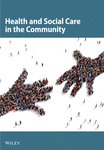Informal carers of cancer patients: what are their unmet psychosocial needs?
Abstract
This paper considers the significant unmet psychosocial needs of the informal carers of cancer patients, drawing on data generated in a 3-year UK study (1997–2000) on the psychosocial needs of cancer patients and their main carers. While the needs of the carers of cancer patients are increasingly being recognised in healthcare policy documents, there is relatively little published literature on these needs. A ‘significant unmet need’ is defined here as a need deemed important by the carer, but which has not been met. A descriptive cross-sectional survey of carers was conducted and the responses of 195 carers relating to 48 psychosocial need items were analysed. A subset of these carers (n = 32) were interviewed. Forty-three per cent of carers had significant unmet needs. They were more likely to be those where the relationship to the patient was not that of a partner or spouse, more likely to have other caring responsibilities, and less likely to have friends or relations to call upon for help. Carers with unmet needs were also more likely to be in poor health themselves or to be caring for a patient who had reached the palliation-only phase in their cancer journey. The majority of carers expressed the importance of needs such as having good relationships with healthcare professionals and receiving honest information, but few expressed dissatisfaction with these aspects of need. Items of significant unmet need clustered around aspects of managing daily life, emotions, and also social identity for a sizeable minority of carers. These are the same areas of significant unmet need that concern patients. However, carers have more of these concerns, reflecting their comparative neglect. The paper also considers how these widespread concerns can be addressed.




